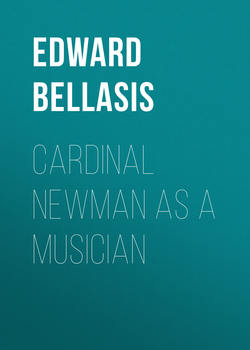Cardinal Newman as a Musician

Реклама. ООО «ЛитРес», ИНН: 7719571260.
Отрывок из книги
It is a remark of St. Philip Neri's latest biographer that, "Our Saint was profoundly convinced that there is in music and in song a mysterious and a mighty power to stir the heart with high and noble emotion, and an especial fitness to raise it above sense to the love of heavenly things."1 In like manner the Saint's illustrious son, Cardinal Newman, has spoken of "the emotion which some gentle, peaceful strain excites in us," and "how soul and body are rapt and carried away captive by the concord of musical sounds where the ear is open to their power;"2 how, too, "music is the expression of ideas greater and more profound than any in the visible world, ideas which centre, indeed, in Him whom Catholicism manifests, who is the seat of all beauty, order, and perfection whatever."3 Music, then, to him was no "mere ingenuity or trick of art like some game or fashion of the day without meaning."4 For him man "sweeps the strings and they thrill with an ecstatic meaning."5 "Is it possible," he asks, "that that inexhaustible evolution and disposition of notes, so rich yet so simple, so intricate yet so regulated, so various yet so majestic, should be a mere sound which is gone and perishes? Can it be that those mysterious stirrings of heart, and keen emotions, and strange yearnings after we know not what, and awful impressions from we know not whence, should be wrought in us by what is unsubstantial, and comes and goes, and begins and ends in itself. It is not so; it cannot be. No; they have escaped from some higher sphere; they are the outpourings of eternal harmony in the medium of created sound; they are echoes from our home; they are the voice of angels, or the Magnificat of saints, or the living laws of Divine governance, or the Divine attributes, something are they beside themselves, which we cannot compass, which we cannot utter."6 And with him, as with St. Philip, may we not say that music held "a foremost place in his thoughts and plans"?7 True, out of its place, he will but allow that "playing musical instruments is an elegant pastime, and a resource to the idle."8 Music and "stuffing birds"9 were no conceivable substitutes for education properly so called, any more than a "Tamworth Reading-Room" system could be the panacea for every ill; but so long as an art in any given case did not tend to displace the more serious business of life; should it become for such an one an "aid to reflection," or, per contra, profitably distract him; in brief, if it anywise helped a soul on to her journey's end, then welcome the "good and perfect gift."
Readers will remember here the passage in Loss and Gain: "Bateman: 'If you attempt more, it's like taxing a musical instrument beyond its powers.' Reding: 'You but try, Bateman, to make a bass play quadrilles, and you will see what is meant by taxing an instrument.' Bateman: 'Well, I have heard Lindley play all sorts of quick tunes on his bass, and most wonderful it is.' Reding: 'Wonderful is the right word, it is very wonderful. You say, "How can he manage it? It's very wonderful for a bass;" but it is not pleasant in itself. In like manner, I have always felt a disgust when Mr. So-and-so comes forward to make his sweet flute bleat and bray like a haut-bois; it's forcing the poor thing to do what it was never made for.'"22
.....
In March, 1883, he observed that he missed the minor key in Palestrina, and on our adding that, perhaps, Mendelssohn had too much of it, he went on, "It cuts me to the heart that minor," and so he liked the mixed mode to the Psalm In exitu Israel, and was much affected by the slow movements in Beethoven's Ninth Quartet and C minor Symphony, and the Allegretto of the Symphony in A.
There was just that human element about it, so "deeply pathetic," which in the same way made him prefer Euripides to Sophocles, for all the latter's "sweet composure, melodious fulness, majesty and grace."24 And here we may add, that as late as January, 1890, apropos of a Greek play for his school, he was as keen and eager as ever about the merits of Euripides, expressed himself as being at a loss to understand the critics invariably preferring Sophocles to the other two, and evidently placed Euripides and Æschylus first and second respectively. A frequently true and natural feeling, whether displayed by the author of the Bacchæ, or by the composer of Fidelio, evidently almost atoned, in his estimation, for every deficiency.
.....